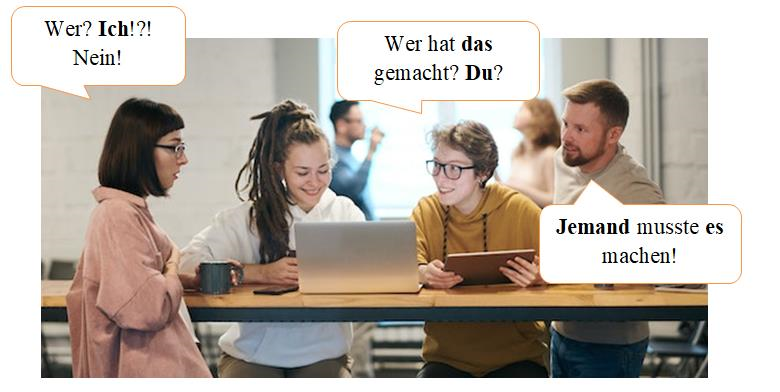In this lesson, you will learn all about pronouns in German, what pronouns exist and how they work.
Thank you for reading this post, don't forget to subscribe!CONTENT
What are pronouns in German?
Personal pronouns
Possessive pronouns
Demonstrative pronouns
Indefinite pronouns
Reflexive Pronouns
Relative Pronouns
Interrogative pronouns
I’m sure you’ve already come across words like er, sie, es or mein, dein, sein. Even if you were at the very beginning, you already had to meet them. And I’m sure you know that those are personal and possessive pronouns. Although it seems that they are easy to learn and that there should be no problems using them, I have noticed that for some students the use of pronouns causes problems. So let’s get some things straight.
Click on:
Grammar Contents
What are pronouns in German?
Pronouns are words that replace nouns, refer to them, but sometimes stand in place of an entire sentence. When they stand in place of nouns, they cannot appear together with them, either a noun or a pronoun stands.
Almost all pronouns change in gender, number and case, and some of them also change in person.
But also pronouns, such as possessives, can follow a noun and then adapt to the noun. They behave like articles and receive endings like articles.
That’s why there are two names in the German language, according to the role of possessive pronouns:
Possessivpronomen – when the possessive pronoun stands alone.
Possessivartikel – when a possessive replaces a noun.We will simply call them possessive pronouns.
Pronouns are divided into:
Personal pronouns (Personalpronomen)
Possessive pronouns (Possessivpronomen)
Demonstrative pronouns (Demonstrativpronomen)
Indefinite pronouns (Indefinitpronomen)
Reflexive Pronouns (Reflexivpronomen)
Relative Pronouns (Relativpronomen)
Interrogative pronouns (Interrogativpronomen)
Personal pronouns / Personalpronomen
Personal pronouns are often used to replace a noun and are very convenient to avoid repetition. Personal pronouns do not only refer to people, but can also refer to objects or facts.
ich, du, er, sie, es, wir, ihr, sie, Sie
For example:
Das ist Mirko. Er kommt aus Italien. – This is Mirko. He’s from Italy.
Ich gehen ins Konzert. Kommst du mit? – I’m going to the concert. Are you coming?
Lea hat ein neues Kleid. Sie hat es 90 Euro bezahlt. – Lea has a new dress. She paid 90 euros for it.
Possessive pronouns / Possessivpronomen
Possessive pronouns can be substitutes or companions of another word. They indicate ownership or belonging.
mein, dein, sein/ihr/sein, unser, euer, ihr/Ihr
For example:
Kennst du meine Schwester? – Do you know my sister?
Unsere Eltern heißen Mark und Maya. – Our parents are called Mark and Maya.
Das ist mein Sohn Dario. – This is my son Dario.
Demonstrative pronouns / Demonstrativpronomen
Demonstrative or demonstrative pronouns refer to beings or objects, their properties and size by distance and replace other words.
der/die/das, diese/-r/-s, jene/-r/-s, solche/-r/-s, derjenige/diejenige/dasjenige, derselbe/dieselbe/dasselbe,
For example:
Ich möchte diese Jacke kaufen. – I would like to buy this jacket.
Diese Jacke!? Jene ist schöner. –This jacket? This one is nicer.
Wem gehört dieser Rucksack? –Whose backpack is this?
Indefinite pronouns / Indefinitpronomen
Indefinite pronouns have the function of referring to indefinite people or things. With the help of indefinite pronouns, statements can be made about something for which it is not known exactly who or what or how many participated in a certain action. The indefinite pronoun man is also used as a passive pronoun.
alle, einige/-r/-s, etliche, etwas, jede/-r/-s, jemand, man, manche/-r/-s, niemand
For example:
Es gibt noch mehrere Probleme. – There are still several problems.
Alle sind schon angekommen. – All of them have already arrived.
Ich lese jedes Buch, dass sie schreibt. – I read every book she writes.
Reflexive Pronouns / Reflexivpronomen
Reflexive pronouns refer to the subject in the sentence. The reflexive pronoun is used to return to the subject of the sentence to indicate that the action of the sentence refers to the actor himself.
mich, dich, sich, uns, euch, sich
For example:
Er ärgert sich über seinen Chef. – He is annoyed with his boss.
Sie kümmert sich um ihre Schwester. – She takes care of her sister.
Ich freue mich auf deinen Besuch. – I look forward to your visit.
Relative pronouns / Relativpronomen
Relative pronouns introduce relative clauses and refer to the preceding noun. They introduce a relative clause and give more information about the noun they refer to. The relative pronoun matches gender and number with the corresponding noun. The case depends on the function of the relative pronoun in the dependent clause. Reflexive pronouns go with reflexive verbs.
der, die, das, welche/-r/-s, wer/was
For example:
Das ist die Frau, die ich gestern gesehen habe. -This is the woman I saw yesterday.
Gestern habe ich Freunde getroffen, denen ich Geld geliehen habe. – Yesterday I met some friends who I lent money to.
Wo ist der Mann, dem du geholfen hast? – Where is the man you helped?
Click on:
Grammar Contents
Interrogative pronouns / Interrogativpronomen
Interrogative pronouns in German are:
wer, was, welche/-r/-s, was für ein?
With wer you ask about persons and living beings, and with was you ask about things, states, calls or the entire sentence content.
For example:
Wer kommt? – Who’s coming?
Welcher Tag ist heute? – What day is it today?
Was ist hier los? – What’s going on here?
See more:



